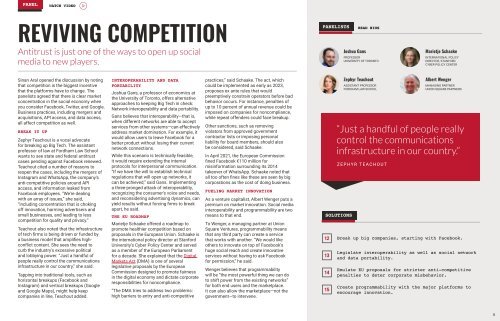You also want an ePaper? Increase the reach of your titles
YUMPU automatically turns print PDFs into web optimized ePapers that Google loves.
PANEL<br />
WATCH VIDEO<br />
REVIVING COMPETITION<br />
Antitrust is just one of the ways to open up social<br />
media to new players.<br />
PANELISTS<br />
Joshua Gans<br />
READ BIOS<br />
PROFESSOR<br />
UNIVERSITY OF TORONTO<br />
Marietje Schaake<br />
INTERNATIONAL POLICY<br />
DIRECTOR, STANFORD<br />
CYBER POLICY CENTER<br />
Sinan Aral opened the discussion by noting<br />
that competition is the biggest incentive<br />
that the platforms have to change. <strong>The</strong><br />
panelists agreed that there is clear market<br />
concentration in the social economy when<br />
you consider Facebook, Twitter, and Google.<br />
Business practices, including mergers and<br />
acquisitions, API access, and data access,<br />
all affect competition as well.<br />
BREAK IT UP<br />
Zephyr Teachout is a vocal advocate<br />
for breaking up Big Tech. <strong>The</strong> assistant<br />
professor of law at Fordham Law School<br />
wants to see state and federal antitrust<br />
cases pending against Facebook renewed.<br />
Teachout cited a number of reasons to<br />
reopen the cases, including the mergers of<br />
Instagram and WhatsApp, the company’s<br />
anti-competitive policies around API<br />
access, and information leaked from<br />
Facebook employees. “We’re dealing<br />
with an array of issues,” she said,<br />
“including concentration that is choking<br />
off innovation, harming advertisers and<br />
small businesses, and leading to less<br />
competition for quality and privacy.”<br />
Teachout also noted that the infrastructure<br />
of tech firms is being driven or funded by<br />
a business model that amplifies highconflict<br />
content. She sees the need to<br />
curb the industry’s excessive political<br />
and lobbying power. “Just a handful of<br />
people really control the communications<br />
infrastructure in our country,” she said.<br />
Tapping into traditional tools, such as<br />
horizontal breakups (Facebook and<br />
Instagram) and vertical breakups (Google<br />
and Google Maps), might help keep<br />
companies in line, Teachout added.<br />
INTEROPERABILITY AND DATA<br />
PORTABILITY<br />
Joshua Gans, a professor of economics at<br />
the University of Toronto, offers alternative<br />
approaches to keeping Big Tech in check:<br />
Network interoperability and data portability.<br />
Gans believes that interoperability—that is,<br />
when different networks are able to accept<br />
services from other systems—can effectively<br />
address market domination. For example, it<br />
would allow users to leave Facebook for a<br />
better product without losing their current<br />
network connections.<br />
While this scenario is technically feasible,<br />
it would require extending the internal<br />
protocols for interpersonal communication.<br />
“If we have the will to establish technical<br />
regulations that will open up networks, it<br />
can be achieved,” said Gans. Implementing<br />
a three-pronged attack of interoperability,<br />
recognizing the consumer’s voice and needs,<br />
and reconsidering advertising dynamics, can<br />
yield results without forcing firms to break<br />
apart, he said.<br />
THE EU ROADMAP<br />
Marietje Schaake offered a roadmap to<br />
promote healthier competition based on<br />
proposals in the European Union. Schaake is<br />
the international policy director at Stanford<br />
University’s Cyber Policy Center and served<br />
as a member of the European Parliament<br />
for a decade. She explained that the Digital<br />
Markets Act (DMA) is one of several<br />
legislative proposals by the European<br />
Commission designed to promote fairness<br />
in the digital economy and dictate corporate<br />
responsibilities for noncompliance.<br />
“<strong>The</strong> DMA tries to address two problems:<br />
high barriers to entry and anti-competitive<br />
practices,” said Schaake. <strong>The</strong> act, which<br />
could be implemented as early as 2023,<br />
proposes ex ante rules that would<br />
preemptively constrain operators before bad<br />
behavior occurs. For instance, penalties of<br />
up to 10 percent of annual revenue could be<br />
imposed on companies for noncompliance,<br />
while repeat offenders could face breakup.<br />
Other sanctions, such as removing<br />
violators from approved government<br />
contractor lists or imposing personal<br />
liability for board members, should also<br />
be considered, said Schaake.<br />
In April 2021, the European Commission<br />
fined Facebook €110 million for<br />
misinformation surrounding its 2014<br />
takeover of WhatsApp. Schaake noted that<br />
all too often fines like these are seen by big<br />
corporations as the cost of doing business.<br />
FUELING MARKET INNOVATION<br />
As a venture capitalist, Albert Wenger puts a<br />
premium on market innovation. Social media<br />
interoperability and programmability are two<br />
means to that end.<br />
To Wenger, a managing partner at Union<br />
Square Ventures, programmability means<br />
that any third party can create a service<br />
that works with another. “We would like<br />
others to innovate on top of Facebook’s<br />
huge social reach and create innovative<br />
services without having to ask Facebook<br />
for permission,” he said.<br />
Wenger believes that programmability<br />
will be “the most powerful thing we can do<br />
to shift power from the existing networks”<br />
for both end users and the marketplace.<br />
It can also allow the marketplace—not the<br />
government—to intervene.<br />
SOLUTIONS<br />
12<br />
13<br />
14<br />
15<br />
Zephyr Teachout<br />
ASSISTANT PROFESSOR<br />
FORDHAM LAW SCHOOL<br />
Albert Wenger<br />
MANAGING PARTNER<br />
UNION SQUARE PARTNERS<br />
“Just a handful of people really<br />
control the communications<br />
infrastructure in our country.”<br />
ZEPHYR TEACHOUT<br />
Break up big companies, starting with Facebook.<br />
Legislate interoperability as well as social network<br />
and data portability.<br />
Emulate EU proposals for stricter anti-competitive<br />
penalties to deter corporate misbehavior.<br />
Create programmability with the major platforms to<br />
encourage innovation.<br />
8
















